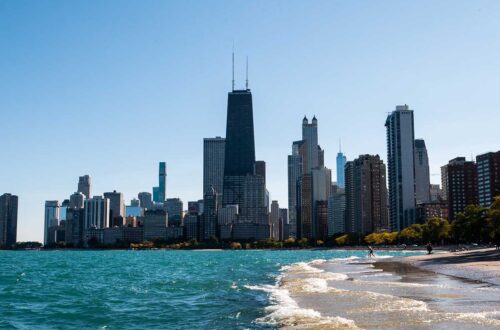
International Travel Tips for Beginners
My first solo international trip was when I was 23 and studied abroad in Italy for the Summer. I didn’t know one person, flew into a foreign language airport, and lost my luggage (yes that’s why my carry-on looks very different these days). It was quite a culture shock and I didn’t know what I didn’t know. If you are preparing for your first (or just need a refresher) trip overseas, here are my best international travel tips for beginners.
If you buy something through my links, I may earn a small commission at no additional cost to you. I appreciate your support! See disclosure for details.
Table of Contents
How to use Your Cell Phone?
Everything is on our phones so it’s pretty important to figure out a game plan with yours before you go.
You have options! Most service providers offer an international phone plan, that may be the easiest and the most expensive. Reach out to your provider in advance and you’re good to go, just don’t be shocked when the bill comes.
The other option is to keep your plan but when you get to your destination airport look for a kiosk selling SIM cards. Tell the clerk your needs and they’ll tell you which one is right for you. Pop your old SIM card out (DON’T LOSE IT!!!) pop the new one in and your good to go. In my experience, this cost is about 1/3-1/2 of what you’ll spend if you change to an international plan. But…it’s essentially not your phone so you won’t have any phone numbers or contacts stored, which is not a big deal if you plan ahead.
Most buildings have free wi-fi, and in Europe a lot of places have it in public places like the park. Keep that in mind when you are figuring out how much data you think you’ll need.
I’ve done both of the options. If money is no object and you are looking for convenience, go with the phone plan. If you’d rather spend that money on shopping or a meal, go with the SIM card.
Electrical Outlets
As annoying as it is, many countries have different electrical outlets. If you are planning on plugging something in (like a phone) you’ll need the US to whatever country adapter. I like this universal adapter that works in Europe and the UK (because of course, they’re different outlets in London and Paris) since it doesn’t take up a lot of space and there aren’t a bunch of parts to keep track of. Plus USB’s are always a win.
Check into Visa Requirements
You generally need a passport to travel overseas so that’s not a tip, but more of a given. What may not be a given is depending on where you go you may need a Visa. I never really paid attention to Visas, I thought they were more for extended trips until I went to China.
In some countries, you need a Visa to visit, even for a short vacation. I’ve used this company to get mine and they’ve been great to work with. Check out the link and you’ll see which countries you need a visa for, even if visiting as a tourist.
Related: Unexpected travel essentials that don’t take up a lot of space
Get Vaxed and Waxed (and other medications)
Depending on where you go you may need to get a vaccine or start on medication. An African safari is on my bucket list and to visit vaccines & medication are recommended and required. If you do need to get a vaccine do your research and book the appointment far enough in advance. I would say 4-6 weeks before departure to make sure you are fully immunized. The CDC and the State Department have great resources to research what’s required and what’s recommended.
International Currency Exchange
Like the phone, there are multiple ways to exchange currency, but I always recommend having some cash on you.
My favorite option is to contact your bank and tell them you’d like to exchange some currency. It’s convenient because you just tell them how much you want, they’ll withdraw it out of your account and hand you cash in your desired currency. Not only is it easy, but they usually have the best exchange rate as well. You’ll need to plan ahead because most banks don’t keep a lot of foreign currency on hand, this can usually take a couple of days in my experience (in a large city).
If you failed to plan but have time at the airport before departure, there will be International Currency Exchange Kiosks. These are also convenient but generally don’t have the best rate and can somewhat have high fees. But hey, do you really want to land with zero cash?
If you find yourself running low on cash at your destination you can go to a bank and use your ATM card for a withdrawal. You’ll probably be out of network, so you may get hit with fees from that bank and your bank, but because it’s a bank the exchange rate is generally pretty fair.
Using Credit Cards Abroad
Find a card that doesn’t have any foreign transaction fees so you aren’t charged every time you use it. You want to make sure that you are actually able to use the card and it’s not flagged as potential fraud, so notify the card company in advance. I’ve learned the hard way when I forget to give the dates and locations to my card company when the charge doesn’t go through. It’s embarrassing enough in the US, but you do not want this while in a foreign country.
Credit cards may not be accepted everywhere they are in the US, which is another reason it’s always good to carry some cash. On our last cab ride out of the UK (they didn’t allow ride-sharing at the time) we found ourselves with not enough cash and he didn’t take credit cards. That was uncomfortable! If memory serves me he settled for all the Pounds we had but it is not something I’ll repeat again.
When you use your credit card you’ll be asked if you want the transaction to be done in local currency or your home currency. Meaning…if you are from the U.S. and are traveling to Europe they’ll ask if you want it in US dollars or Euros. It might seem convenient to have it in US dollars so you know exactly what you are being charged but don’t do it! The restaurant, hotel, whatever it is can use whatever exchange rate they want. You want to use local currency and then the exchange rate should be very close to the market rate.
International Air Travel
It’s pretty widely known that business class and first class are where you get a lot of benefits and amenities. But you do get some perks in economy long-haul international travel that you don’t get in domestic. Generally, you’ll get full meal service as well as complimentary beer & wine. The food may not be great but at least it’s one less thing you have to pack (although I’m a big snack packer when I travel).
If you do want to spring for business class or first class or get the opportunity to upgrade, do it!!! Most long-haul international business class flights have 100% laydown seats, more space, better food and beverage options, and an amenity kit. You will get to your destination more refreshed than sitting in economy.
DISCLOSURE: If you buy something through my links, I may earn an affiliate commission, at no cost to you. I only feature products I would use myself, and all opinions expressed here are my own. I am very obsessed with FTC compliance so check out my full disclosure for details.
Pin post to save for later:







